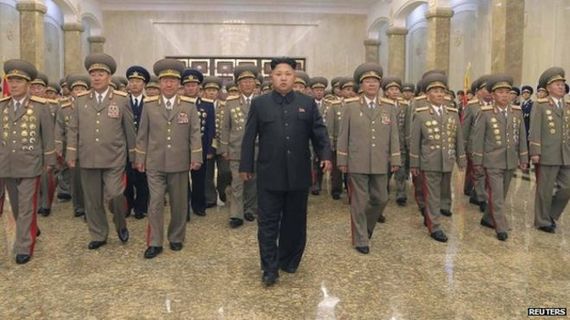The United States and the Democratic Peoples Republic of Korea haven't had formal diplomatic relations since the bloody Korean War ended in 1953. Since that time, U.S.-North Korean relations have been about as productive and pleasant as the ties that bind Hillary Clinton and Donald Trump. And for most in Washington, that's ok; with few exceptions, sanctioning North Korea for its nuclear weapons program, ballistic missile activity, or egregious human rights abuses is something every politician can agree on. If you desire to get the most conservative Republican and most liberal Democrat together in the same room, all you need to do is mention that the madmen of North Korea's leadership is on the chopping block.
Kim Jong-un's decision to completely sever any and all contact with U.S. officials, however, is a bold and potentially dangerous move that will not only make a bad relationship even worse, but could also contribute to heightened tensions on the Korean Peninsula.
A tit-for-tat between Washington and Pyongyang is nothing new for these two powers. It's beyond understandable, after all, for the U.S. Government to shy away from any improvement in relations with a state that threatens to turn Washington, DC into a cloud of nuclear debris. History over the past two decades and through successive Democratic and Republican administrations point to a North Korean problem that is immune to every policy option on the table. Economic sanctions through the U.N. Security Council, isolation, containment, "strategic patience," occasional negotiations, and threats of military force have all led to an equally undesirable solution: Pyongyang with an ever growing nuclear weapons stockpile. As such, Presidents George H.W. Bush, Bill Clinton, and George W. Bush all left office frustrated in their dealings with the Kim dynasty. President Barack Obama will follow in their footsteps.
The normal cycle of reaction-counter reaction, however, has been especially pronounced this year. With every belligerent action from the North Koreans comes a response from the west that only angers Kim and his clique further. A series of ballistic missile tests and the North's fourth underground nuclear test explosion in January resulted in a severe round of recrimination from the U.S. For the first time in three years, the U.N. Security Council passed a strong resolution with China's support that would mandate inspections of all cargo into and out of the DPRK. But it was the Treasury Department's decision to slap sanctions on Kim Jong-un personally "for having engaged in, facilitated, or been responsible for an abuse or violation of human rights," that sent Kim over the edge.
Cutting off Pyongyang's New York channel may not seem a big deal in the grand scheme of things. On the bright side, at least North Korean officials were prudent enough to refrain from violence as a form of retaliation.
But Kim's decree is in actuality highly consequential; the DPRK's delegation at U.N. headquarters has been an effective point of contact in the past for possible nuclear talks between North Korea, the U.S. and the Six-Party group. Options have been explored, preliminary discussions and letters have been exchanged with North Korean diplomats stationed in New York, and situations that could have spiraled into something much more serious were toned down to a degree by leveraging reaching out to the DPRK delegation. At the very least, North Korea's permanent mission in New York afforded the United States with a better understanding of a country that is frequently described by U.S. intelligence officials as a black hole.
Kim has upped the ante by cutting the last point of contact between U.S. and North Korean officials. It may not be popular in a town that is used to demonizing the North Koreans, but the U.S. would be best served by signaling to Kim's circle that Washington will not continue this round of escalation and is willing to pare back the tension if Pyongyang is willing to reciprocate.
Sometimes staving off further deterioration means taking the initiative through a bold diplomatic gamble. We may be at that point now with the North Koreans.
*Daniel R. DePetris is a fellow at the Defense Priorities Foundation.

